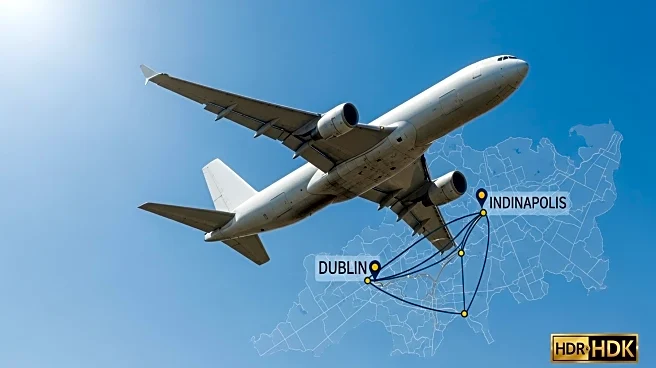What's Happening?
FedEx has initiated a direct cargo flight service between Dublin, Ireland, and Indianapolis, Indiana. This new route operates four days a week and is designed to reduce shipping times by a full day by bypassing congested coastal gateways. The service aims to strengthen the connection between Ireland's export-driven economy and the U.S. Midwest, particularly benefiting sectors such as pharmaceuticals and medical equipment, which are significant components of Ireland's trade with the United States. Richard Smith, FedEx's Chief Operating Officer, highlighted the strategic importance of this route in enhancing the company's capabilities in the global air freight market, particularly for U.S.-based customers looking to reduce delivery times to Europe’s innovation hubs.
Why It's Important?
The introduction of this direct cargo route by FedEx is significant for several reasons. It enhances the efficiency of trade between Ireland and the U.S., particularly benefiting industries such as healthcare, electronics, and aerospace, which are experiencing growth in Europe. By reducing delivery times, FedEx is positioning itself as a key player in supporting these expanding sectors. This move also reflects broader trends in global trade, where companies are seeking to optimize supply chains amidst uncertainties. The strategic redesign of FedEx's international network, including advanced digital tools, underscores the importance of agility and innovation in logistics to meet the demands of modern commerce.
What's Next?
FedEx's new route is likely to prompt other logistics companies to consider similar strategies to enhance their service offerings and reduce transit times. As industries in Europe continue to grow, particularly in innovation hubs, there may be increased demand for efficient logistics solutions. Stakeholders in the logistics and supply chain sectors will be closely monitoring the impact of this route on trade volumes and customer satisfaction. Additionally, FedEx may explore further expansions or enhancements to its network to capitalize on emerging market opportunities.
Beyond the Headlines
This development could have deeper implications for the logistics industry, particularly in terms of how companies leverage technology and strategic planning to navigate global trade challenges. The focus on reducing delivery times and enhancing connectivity may drive further investments in digital tools and infrastructure. Moreover, the emphasis on supporting key sectors like healthcare and aerospace highlights the role of logistics in facilitating innovation and economic growth.









